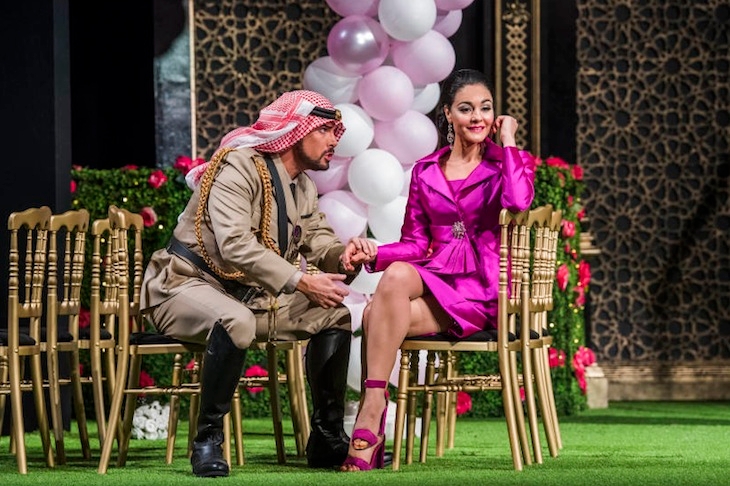Anyone who thinks they have experienced absolute boredom, or even doubts that such a state can exist, should go to Glyndebourne’s first offering of the season, Cavalli’s Hipermestra. The first two acts, played without any break, last for 130 minutes, the third for a mere hour. The audience broke into its normal rapturous applause at the end, no doubt to reassure itself that it still existed. This opera of the inordinately productive Cavalli has been revived only once since its first outing in 1658, and I can only hope that its present resurrection is temporary and its second death final.
Arriving at Glyndebourne, we saw a couple of Arabian newlyweds strolling round the grounds, then another pair, then another, at which point my companion twigged that they were part of the act. The tiny orchestral ensemble, including its conductor and harpsichordist, William Christie, who in his article in the weighty programme book looks forward to a succession of Cavalli revivals in this setting, were similarly dressed in Arab costume, which didn’t prevent them from playing like angels, on or off the stage, nor from being treated like slaves — though Graham Vick, the producer, has of course updated the action to the present and the Middle East, so that the reflective Glyndebourne audience can dwell on its contemporary relevance. Not easy to summarise what that relevance is, considering the action concerns the 50 daughters of King Danao being required to marry his 50 nephews, and kill them all on their wedding night, since the oracle has warned him that one of the nephews is destined to kill him, Danao.
We see the married couples processing through the arch of balloons, Aida-style, as the opening music is played. Naturally, one of the daughters, Hipermestra, falls in love with her bridegroom Linceo, launching the three hours that follow. Complicated action ensues. In due course, Danao is murdered, and Hipermestra gets so desperate that her husband has fallen for someone else that she hurls herself off a rock, but is caught by a passing peacock — ‘moments of grace do happen’, Vick assures us in the programme. It could be a nice idea for a fresh production of Tosca, with the heroine rescued from Scarpia’s henchmen.
The tragedy we witness at Glyndebourne is that the cast of this insufferable rubbish is a marvellous one: how I’d have loved to see and hear them in one of Monteverdi’s last two masterpieces, a composer who is being neglected in the very place where the modern renaissance of his masterpieces was decisively launched. Seeing his great operas has made us accustomed to accompanied recitative blossoming into arioso or aria or duets. In Cavalli recitative is the diet throughout, with a couple of noble exceptions, and a concludingsimultaneous pair of love duets that even end with the same words as Poppea, ‘mio tesoro’.
This immensely garrulous opera (Christie reassures us that he has cut an hour’s music from it) has been learned, heaven knows how, by an international team of mainly young, highly gifted singing actors, led by the Hungarian Emoke Barath, whom I long to see in a Mozart opera, in the title role, and the equally winning Raffaele Pe as her lover Linceo. There is a tiresome travesti role, a disillusioned old nurse, who puts in periodic unwelcome appearances, and descends to the pit to molest Christie, and — I couldn’t quite see this, but to judge from the laughter of those who could — hilariously molests members of the audience in the front row. Mark Wilde seemed to enjoy taking the part.
The settings, by Stuart Nunn, are elaborate and extravagant. At one point, my First Law of opera production is violated: a car is driven on to the stage, its lights blinding — and is followed shortly after by an army truck. Any production which resorts to that is in trouble, and this one, in particular, seemed to feel that we needed constant visual stimulus, the aural kind being so minimal. No doubt this production will soon be on DVD.
A few evenings earlier we had at the Barbican a baroque opera from when the genre was at its peak, Handel’s Ariodante, under the superb direction of Harry Bicket. Two of the singers were replacements, but it was an increasingly enjoyable evening — Act One, as usual with Handel, being the least rewarding. This intense and sometimes funny opera was nearly turned into a mere concert by applause after almost every number, but it survived effortlessly. Perhaps Alice Coote, in the title role, overdid things, lunging round the stage and lunging, too, at her bottom notes, producing effective but strange sounds. Ginevra was the radiant Christiane Karg, and Sonia Prina the villainously dressed and villainously coiffured Polinesso. In the minor role of Lurcanio, David Portillo made a powerful impression, but this was above all an opera in which the teamwork triumphed.






Comments